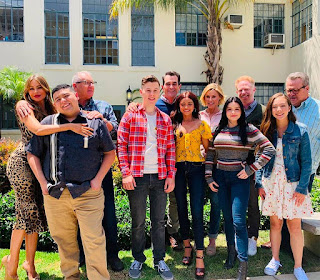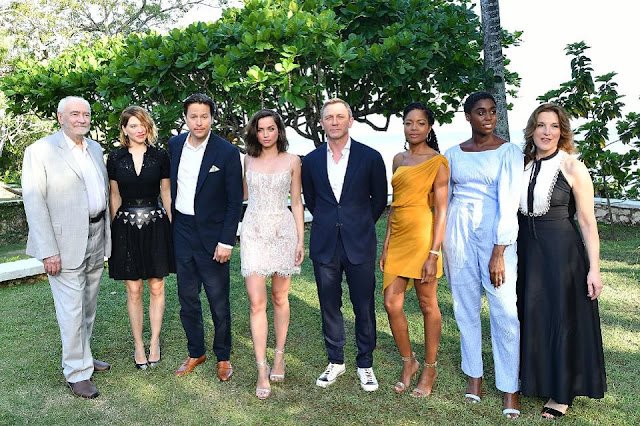The Success Story of ABC's 'Modern Family'
Despite it's loveable characters and hilarious storylines, 'Modern Family' became an unprecedented success by pushing boundaries with its format, depiction and topicality
 |
| 'Modern Family' (CREDIT: ABC) |
by Jack Linsdell
Back in 2009, the TV network ABC aired the pilot to Christopher Lloyd and Steven Levitan's new sitcom Modern Family. The episode introduced us to three different families (nuclear, step and same-sex) living in Los Angeles, all of whom are interrelated through Jay Pritchett and his two adult children Claire and Mitchell. We met Jay (Ed O'Neill), his second wife Gloria (Sofia Vergara) and her son Manny (Rico Rodriquez). We also met Jay's son Mitchell (Jesse Tyler Ferguson), his husband Cam (Eric Stonestreet) and their adopted Vietnamese daughter Lily (Aubrey Anderson-Emmons). And, we met Jay's daughter Claire (Julie Bowen), her husband Phil (Ty Burrell), and their three children Hailey (Sarah Hyland), Alex (Ariel Winter) and Luke (Nolan Gould). The pilot also introduced us to Modern Family's pioneering mockumentary and "breaking the fourth wall" format, which grounded the comedy and characters in a sense of reality, and immersed the audience deeper into their "world". The pilot set the bar high with an exceptionally well-written and performed episode, one that led to the network quickly ordering a whole series.
The first season, which took the pilot's best bits and developed them over 24 hilarious and poignant episodes, became a breath of fresh air for situational comedy. And, although producing high quality and very funny episodes on a week by week basis, attracting an average viewership of 9.46 million, no one could have predicted the astronomical success the show would endure. Modern Family eventually became ABC's longest running comedy, lasting ten years, eleven seasons (the finale aired back in April this year) and picking up a staggering 22 Emmy awards from 75 nominations, not to mention a Golden Globe for Best Comedy Series in 2011. It made household names of its leading stars, especially Sofia Vergara (who would go on to become a sex symbol for a whole generation and one of the highest paid TV actresses in the world), not to mention turning the children into emerging stars. But, why did Modern Family become so successful?
Well...firstly, it comes down to something I've touched on before - the creation of loveable and relatable characters. Think Joey in Friends or Red Forman in That 70s Show, sitcoms have the unique ability to create characters that audiences love spending time with (whether that be because they find them funny and/or see parts of themselves in their personalities). Unlike a movie that's over within two hours, sitcoms have the potential for a long run format, one where audiences can keep hanging out with the characters they love for years and years to come. As I say, the conventional series of 24 episodes at 20 minute runtimes gives audiences 8 hours with their favourite characters, compared to a mere 2 hours in a movie. Modern Family is no exception, full of charming and highly relatable characters, all with their own quirks, charms and identities. Sure, the writing is top notch, but like with all great sitcoms, it's the performances of each actor, and their specific portrayals of specific characters that really turns them into such popular and well loved characters. Everyone can find themselves represented in at least one character in Modern Family which is partly why the show has lasted as long as it has. People have invested into the characters and want to see more of them. Personally, I'm most like Manny although my favourite has to be Phil (played so well by Ty Burrell).
Another important reason why Modern Family has run for so long is the way it normalises (and finds humour in) what it's like to be a, um...modern family. As mentioned earlier, it takes often taboo subjects like gay marriage, adoption, divorce and being an immigrant amongst many other things and portrays them in a way that feels so honest and moving, but in very amusing way. To have Mitch and Cam (an openly gay couple who get married on the show the year before America legalised it) on prime time viewing not only made Modern Family uniquely placed in its acknowledgement of today's society compared to other shows, but also extended its audience appeal by representing demographics who weren't used to seeing themselves on screen. Sure, Sofia Vergara's beauty become a very self-conscious appeal of the show which she and the writers played too, but beyond that, for immigrants and ethnic minorities to see themselves on prime time American TV was, and still is, a big deal. That's another big reason why the show has become so popular and successful because it didn't hide from the changes society has undergone in recent years, and actually sold itself on actively embracing them as being its core appeal.
Lastly, part of the show's success can definitely be attributed to its unconventional and pioneering format. Just like Miranda, a popular British sitcom that also sold itself on breaking the fourth wall (and also started its run in 2009), Modern Family felt like you were watching a documentary. That style, as previously mentioned, not only made the storylines feel that much more "real world" but also immersed audiences further into the Pritchett's world than if it had been shot with the standard multi camera approach, because it made you feel like a fly on the wall in each family's home. The comedy, and drama, is much more enhanced and impactful when characters are actively aware of the camera being there, glancing at us when things go wrong, or giving a interview to explain events away from the other family members. It's a brilliant format and one which is just as much responsible for the show's brilliance as the lead cast, topical storylines and relatable characters. The fact that it's been ripped off to varying levels of success (think Deadpool) is another testament to how effective it is.
So, as sad as it is that Modern Family has now come to an end, its legacy and success story is one that is both unprecedented and remarkable at the same time. It is perhaps the ultimate sitcom, becoming a product of doing everything "against the norm" in terms of its format, storyline topicality and characters, and proving to be a bigger hit because of it. Clearly, audiences liked the way it pushed boundaries and tried to normalise modern family dynamics and relationships, and in many ways this has led to greater onscreen representation for all sorts of demographics on the small screen.
Modern Family was a big success because it was an hilarious comedy with loveable characters and "I can't imagine anyone else in the role" performances. But, in also being a relatable and poignant drama that represented contemporary society (and it's issues and people) in an honest way, it found itself ingrained in pop culture forever. That's it's true success story.


Comments
Post a Comment